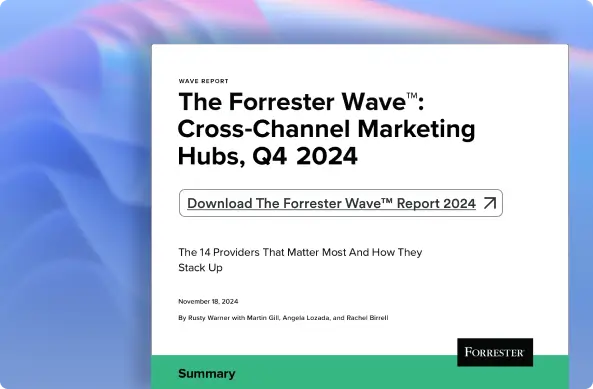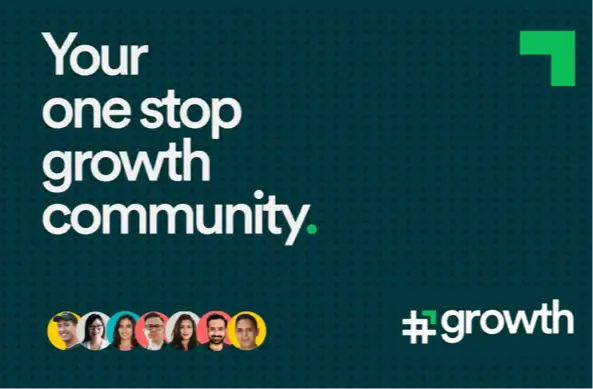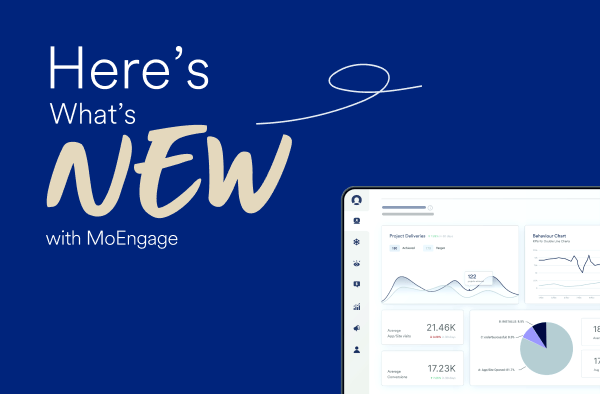Personalization and Privacy: 6 Learnings From WhatsApp’s Privacy Policy Update

Reading Time: 7 minutes
Bonus Content:
|
On 4th January 2021, the Facebook-owned messaging giant, WhatsApp announced an update in its privacy policy. Users were requested to accept the changes by the deadline date of 8th February 2021. Experts suggest failing to accept the changes by the provided deadline would mean users could no longer access the app. What followed next is as unexpected as the announcement and a lesson in personalization and privacy.
In a world where services/offerings are mandated to adhere to compliances like GDPR, CCPA, privacy is the top priority. Naturally, the extent of data-sharing with the parent company, Facebook, covered in WhatsApp’s new privacy policy sparked outrage among users. The speculation arose over the messaging app sharing much more commercial user data with Facebook.
According to the company, however, the data sharing will only serve personalized experience and relevant advertisements. It will also aid in interlinking Facebook Pay account for payment via the messaging app.
The instant messaging app also aims to promote safety by sharing phone numbers and transaction data with Facebook. Previously in October 2020, WhatsApp reiterated its vision to help users get better answers/help from businesses. Even though the messaging app stressed on ‘respect for privacy coded into their DNA’, but the update left users dissatisfied, to put it mildly. The dissatisfaction would manifest in a significant migration of users to other messaging platforms. The tweets from the likes of Elon Musk further fast-tracked the inevitable.
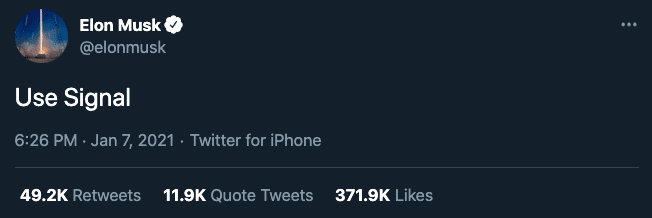
Edward Snowden echoed similar sentiments while clearing the confusion over Signal app.

The resentment among the consumers and the tweets from key opinion leaders reflected in the growth of Signal and Telegram.
During this period Signal’s downloads grew by 2700%:
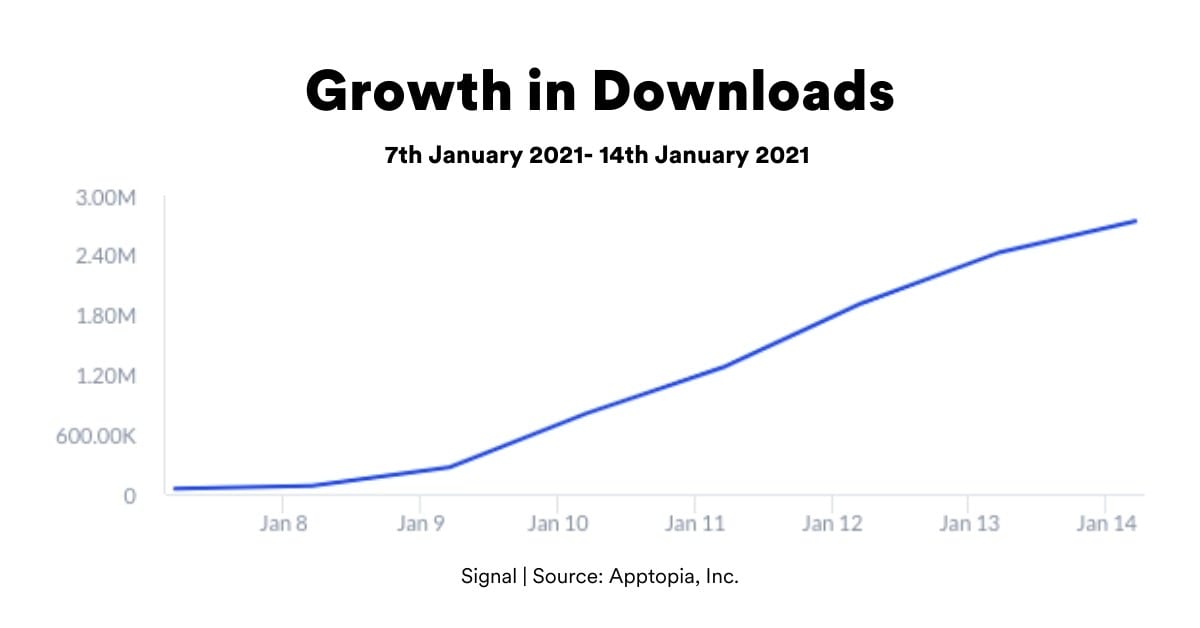
while Daily Active Users (DAU) grew by 130%:
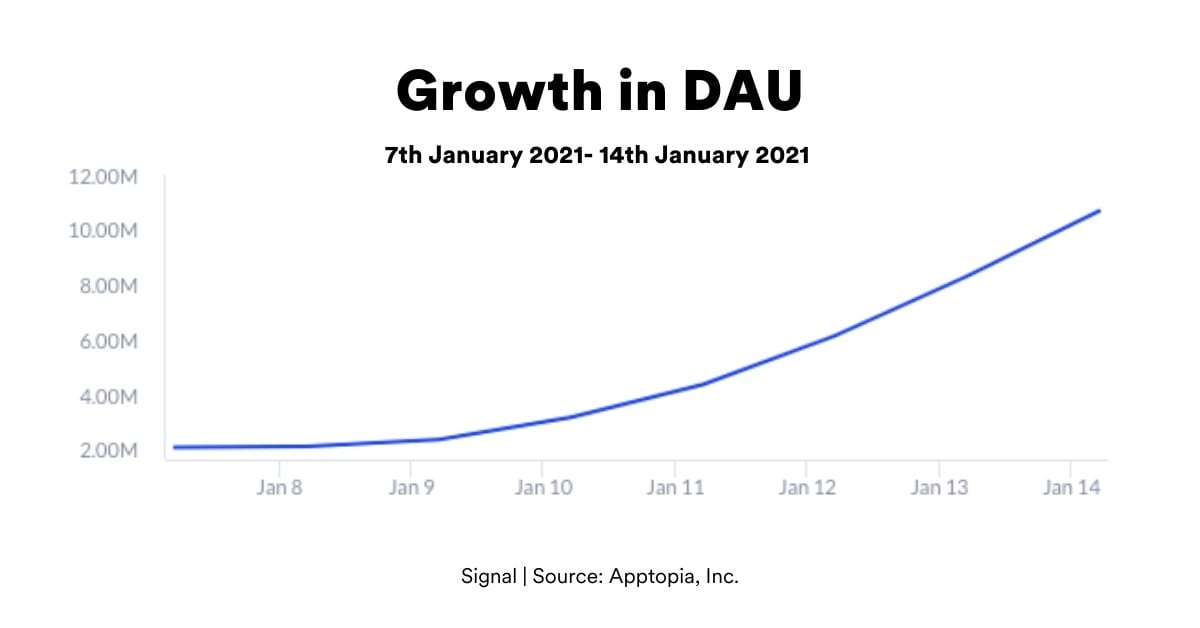
Countrywise download and DAU growth of Signal:
| Country | % increase in downloads | % increase in DAUs |
| India |
13870
|
746.6
|
| United States |
1743
|
94.98
|
| Brazil |
14170
|
673.8
|
| Indonesia |
12630
|
656.1
|
| Germany |
948.2
|
49.84
|
Signal topped the charts in the free apps category on Apple App Store across India, France, Switzerland, Germany, Hong Kong among others. Signal also topped the communication category on the Google Playstore in countries like Australia, United Kingdom, Germany, France, and Canada.
📖 Learnings in personalization and privacy: Tread the thin line between personalized experience and being creepy1. Investing in personalization is a no-brainer for brands especially in the era of Netflix and Spotify recommendations and Instagram targeted ads. In fact, 91% of consumers are more likely to shop with brands that provide customized offers and recommendations while 66% list generic/non-personalized content as a purchase deterrent. As such gathering user data to offer that level of personalization is of the essence. 2. However, there’s a very fine line between data collection and privacy invasion. In order to avoid being perceived as shady or creepy brands, need to walk that tightrope very carefully. According to an Accenture survey, as much as 83% of customers in fact are ready to share data in return for a more personalized experience. What brands need to do is be very cognizant while using the data lest it leads to improper recommendations or worse invasion of privacy. |
Pro-tip: Providing targeted recommendations is a must but be wary of treading the thin line between a personalized experience and invasion of privacy.
During the same time frame Telegram’s downloads went up by 94%:
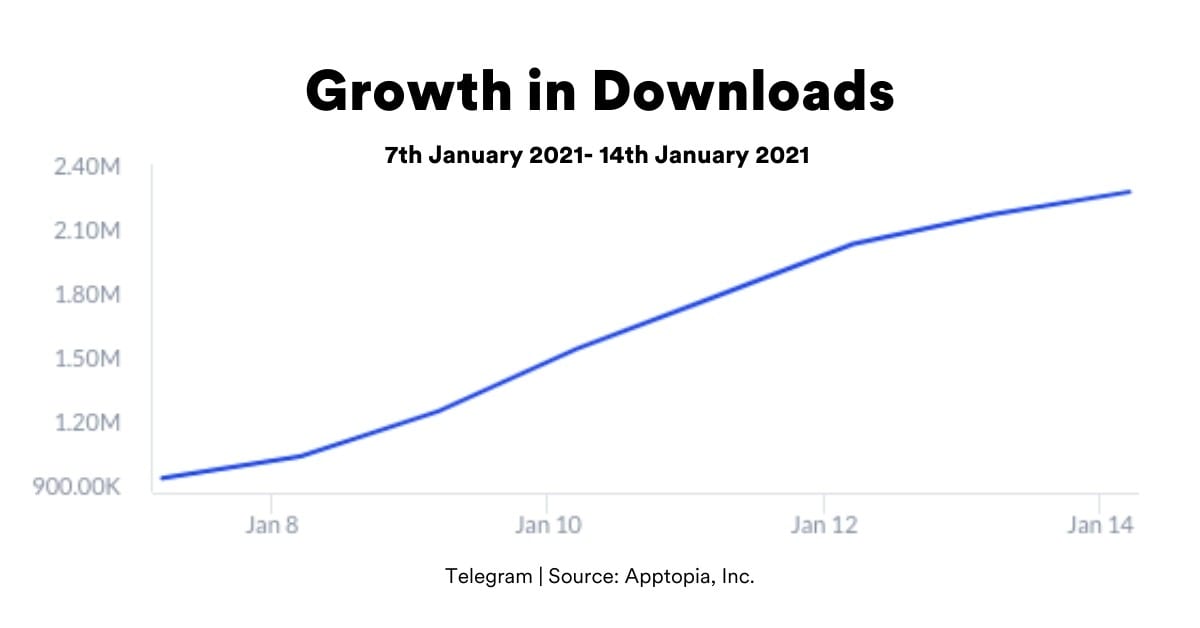
and the DAU numbers followed suit growing by 5.8%:
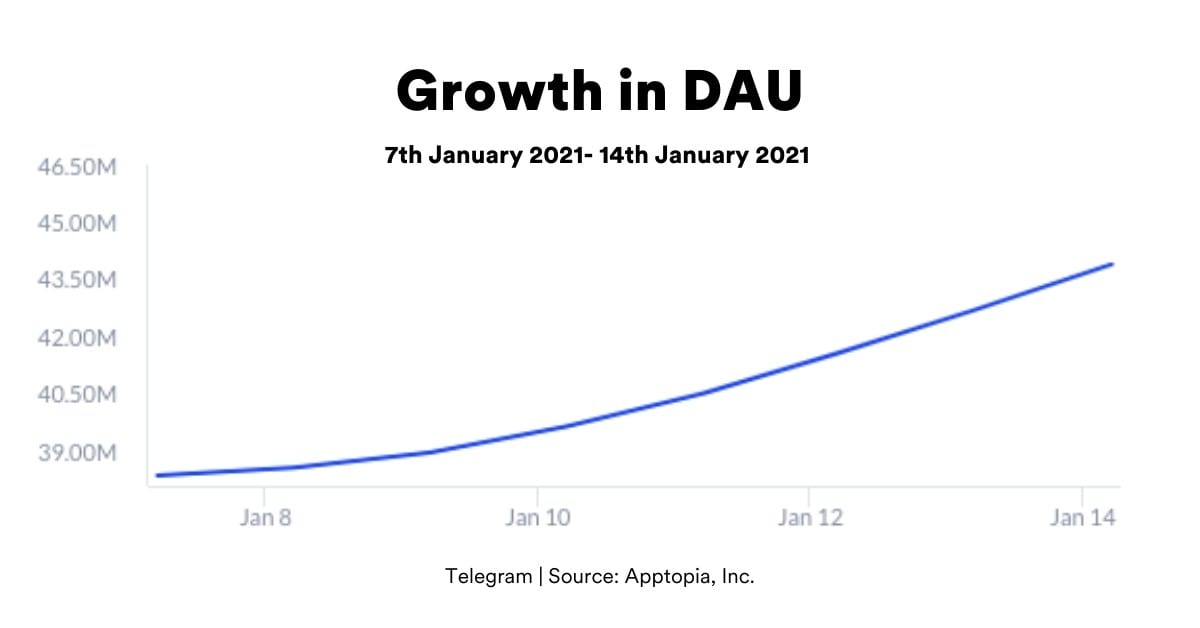
Countrywise download and DAU growth of Telegram:
| Country | % increase in downloads | % increase in DAUs |
| India |
30.82
|
2.6
|
| United States |
339.5
|
11.56
|
| Brazil |
178.7
|
13.74
|
| Indonesia |
52.93
|
3.9
|
| Germany |
140.2
|
7.62
|
Telegram topped the charts in the social networking category on Apple App Store across Spain, Venezuela, Brazil, Argentina, and Russian Federation. Telegram also topped the communication category on the Google Playstore in countries like Mexico, Brazil, UAE, Indonesia, and the Netherlands among others.
📖 Learnings in personalization and privacy: Prioritize transparency to build trust3. The biggest beneficiaries from the WhatsApp privacy update, Signal and Telegram claimed better security features and enhanced user privacy. The impact was very much evident in their respective growth in downloads and DAU numbers as well as rank upliftment. Signal observed an unprecedented increase in downloads between 6th and 10th January 2021 days following WhatsApp’s announcement with the app being downloaded 7.5 million times globally (via Sensor Tower). In the same time frame, Telegram noticed 5.6 million downloads globally. Being transparent and open came up trumps at just the right time. 4. Time and again it has been proven that trust-building is a brand’s single greatest asset to winning the retention game. Building a great product and incorporating best-in-class features can only get you so much unless you deliver on your brand’s promise repeatedly over time thus breeding trust. Communicate very clearly about your complete commitment towards your end-user and their privacy. This will ultimately manifest itself in user patience and trust while you build new features into your product or update policies. Also, ensure that your users understand the changes that are forthcoming in terms of what will change for them and how. Grasp the narrative before your competition takes over it! |
Pro-tip: Focus on building trust, repeatedly live up to the brand promise, clearly communicate how feature changes or policy updates will affect the end-users.
All in all, owing to the personalization and privacy concern over WhatsApp’s policy update, January turned out to be massive for messaging apps. The growth in downloads/usage and the change in rankings of both Signal and Telegram suggests the underlying priority of privacy. In light of the social media uproar and mass migrations, WhatsApp announced that it has decided to push the date to accept the terms and conditions to May 15th, 2021. The instant messaging app further rolled out status updates on their own platform informing users about their commitment to privacy and reiterate the functionality of the end-to-end encryption:
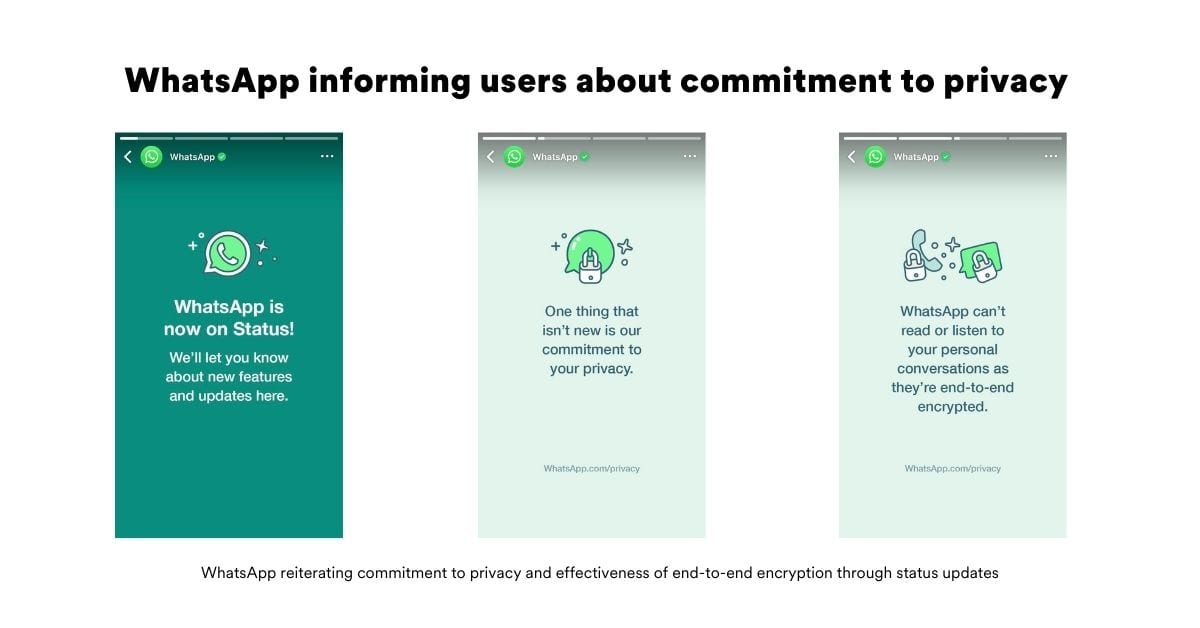
But was this too little too late? Well, the numbers would suggest otherwise. After observing a brief blip in downloads, DAUs, and rankings, the app is getting back to its usual peak. Google Play Store data sheds some more light on the reality juxtaposing WhatsApp’s 5 billion downloads (India) alongside Telegram’s 500 million and Signal’s 50 million.
That, however, didn’t stop the memes from rolling like they usually do:
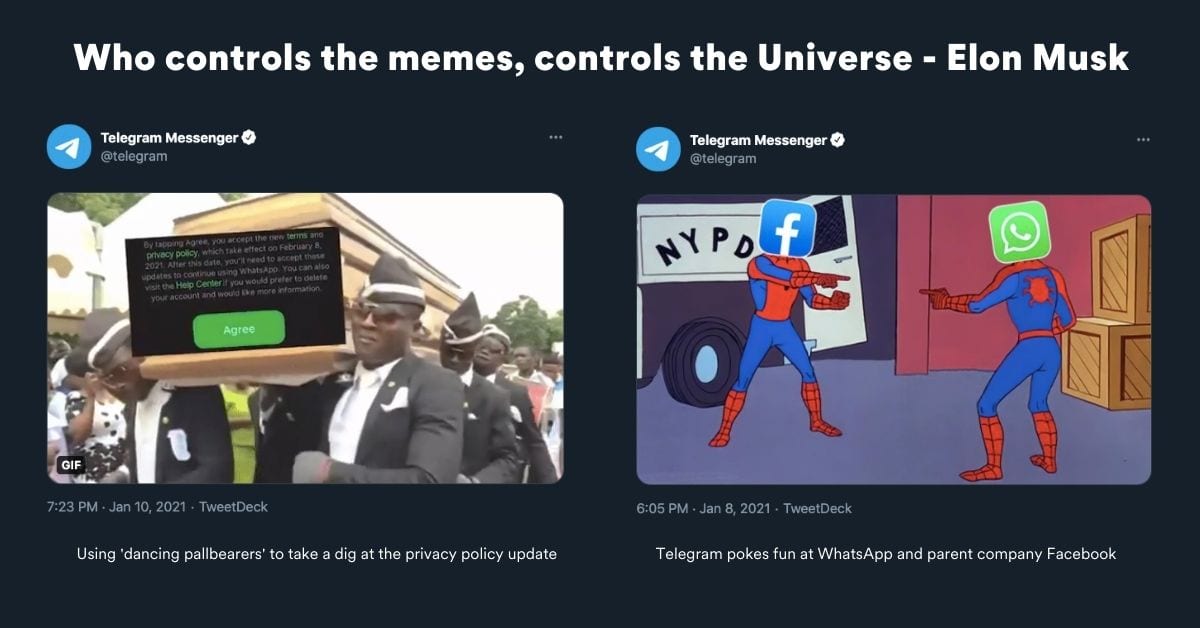
Meet the brain behind the viral ‘Signal’ posters that people mistook for an official ad.
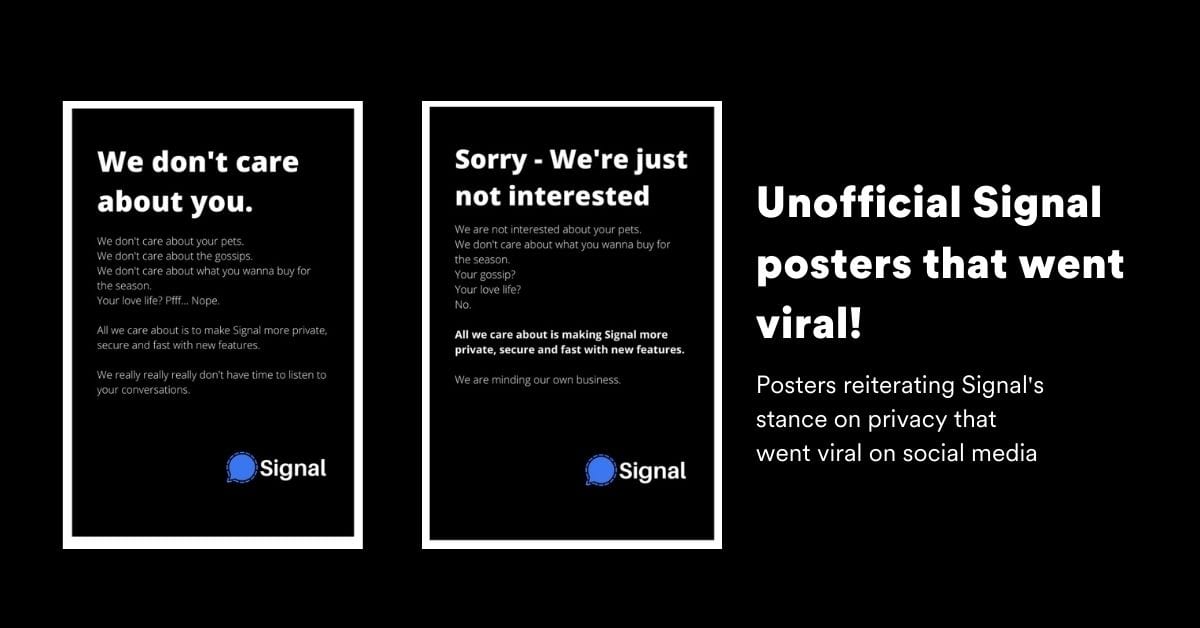
📖 Learnings in personalization and privacy: Customer-centricity and effectively handling change/crisis5. Building a customer-centric culture in your organization should be a topmost priority in this day and age. Perhaps one of the biggest learning lessons to come out of this fiasco is the need to keep your customer at the center of all your decision making. Be in constant touch with them to understand how their perception, preference, and behavior change. Once you understand the change, only then can you affect it. The privacy concerns have been brewing for quite a while now, and if properly addressed through a patient understanding of user sentiments, perhaps this whole situation could have been avoided. 6. During times of uncertainty especially when things are changing, it is very important to come up with ways to engage and reassure your audience. The first step towards effectively handling a crisis involving a change of this scale is to address the ongoing social media chatter. Will Cathcart, Head of WhatsApp, took to Twitter explaining the brand’s commitment to privacy and assuring user’s over the effectiveness of end-to-end encryption. But should it have been done earlier? After all, time is of the essence when it comes to dealing with matters of such urgency. |
Pro-tip: Being customer-centric, open, reassuring end-users, and taking control of the narrative around the crisis is of utmost importance; lest your competitors take control of the uncertainty and spin the narrative.
Conclusion
The migration to alternative messaging apps and the social media uproar in the aftermath of WhatsApp’s new privacy policy update just goes on to show how users value privacy above all else. With regulations like GDPR and CCPA, users now have the power to know who is collecting their data, how it is used, and can even ask for the deletion of same, WhatsApp’s policy of sharing data does come as a shock. Even after clarification from WhatsApp that the company doesn’t collect data from personal chats (messages between family members and friends) and only relies on conveying business data with Facebook for personalizing ads, there have been red flags raised about customer privacy and consent. In the 6 lessons that we have covered in the article, we have shown the thin line that every brand needs to tread between data collection for personalization and privacy concerns. Trust building, transparent communication, change management, and customer-centricity however are the key components.
Here’s What You Can Read Next –
|



